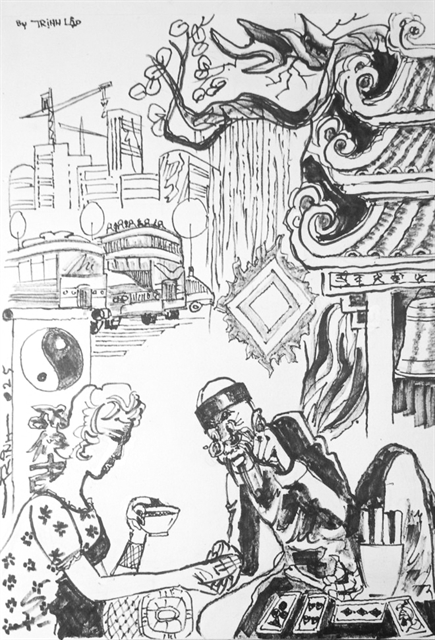 Talk Around Town
Talk Around Town

 |
| Illustration by Trịnh Lập |
By Bảo Long
Việt Nam is one of the least religious countries in the world. Official statistics often classify the majority of citizens as 'non-religious'.
Walk the streets, however, you can quickly realise that non-religious doesn't mean non-spiritual. And it certainly does not mean a lack of faith.
Ancestral altars glow in living rooms, as well as at the feet of banyan trees. The scent of incense lingers in the air, mingling with the ashes of joss paper that drift down the street on every new and full moon.
And fortune-telling, whether palm reading, face reading, astrology or Tarot cards, is similarly popular.
It's not that every Vietnamese person believes absolutely everything they hear from a fortune-teller. But there's an underlying cultural logic of why not?
If the prediction is positive: "you will be successful", "you’ll find love next year", "your son will pass his exams", it offers comfort and motivation. If the prediction is negative, well, you can still buy certain charms, choose auspicious dates, or simply laugh it off.
Often, people interpret predictions in ways that suit their hopes. Fate becomes less a sentence than a plan, but a framework for pursuing what they want. And what could be more motivating than fate by your side?
In a country where rapid social change collides with economic uncertainty, there's an undeniable psychological benefit. Fortune-telling offers a strangely democratic form of hope.
Instead of going to endless sessions of therapy, with the fee surpassing the living expenses of working people, fortune-telling is accessible regardless of wealth or education.
For about VNĐ200,000-300,000 (around US$10), anyone can receive reassurance that tomorrow might be brighter, or at least that today's problems have some larger meaning.
It’s not so different, in that sense, from people buying self-help books or tuning in to motivational podcasts.
One society's coaching could be another’s clairvoyance.
Yet, the very comfort that fortune-telling provides can also become its danger. More frightening than bad judgments is how those become a self-fulfilling prophecy, subtly robbing people of their agency.
The curse of 'she must have two husbands' has probably haunted countless generations of Vietnamese women. It sows suspicion in their hearts, turning every small conflict into signs of inevitable breakdown. Some unconsciously sabotage their happiness to confirm the judgment.
Similarly, a judgment 'you are not destined to be a boss, you should only be an employee' can extinguish a young person's ambition, or 'you two are not compatible in age' can become an invisible wall that prevents true love.
So why do people believe it? Perhaps because in a volatile society, people always crave certainty. Belief in fate, whether good or bad, provides a sense of security that everything is in order. It is ingrained in the mentality, an attitude of 'better safe than sorry' towards the spiritual world.
Although Việt Nam is booming with tech start-ups, high-speed internet, viral TikTok dances and modern lifestyles, fortune tellers can be still easily found, scribbling dates of birth on yellowed paper, involved in million-dollar business decisions.
Young professionals check their horoscope apps before big interviews. Middle-aged businesspeople pick office opening days based on astrology. It's not a contradiction, but a blend. For many Vietnamese, there's no tension between analysing a financial chart and consulting the lunar calendar.
For Western expats, trying fortune telling is less about believing in the predictions and more about understanding this cultural blend.
It's stepping into the mindset of a society that balances pragmatism with mysticism, scepticism with faith. It's about seeing how 'religion' doesn't have to mean organised doctrine; it can mean a mosaic of practices that help people navigate daily life.
And yes, there’s humour in it. A fortune teller once told me I’d 'go to jail' if my ambition overruled my morals, or referred to my friend as destined to be 'lonely in old age'.
Listening to a stranger make shockingly accurate or wildly absurd comments about your personality is a unique opportunity for self-reflection. If the future is built on our choices, then any practice that forces us to examine those choices has value.
There's a lesson here, too, for those who like to scoff at anything unscientific. Fortune-telling reminds us that belief isn't always about truth or falsity. It's about function.
A prediction might not come true, but if it gives someone the courage to apply for a new job, leave a toxic relationship or simply laugh at their anxieties, then it has served its purpose. Faith, in whatever form, is less about accuracy than about impact.
So, should an expat, raised on logic and self-determination, try fortune telling in Việt Nam?
The answer is yes. But not to know your future. It’s to understand a culture.
You won't leave with a clear map of the future, but for a deeper understanding of a culture that faces life's uncertainties with a strange mix of fatalism and fierce hope.
And perhaps, you’ll also find a little bit of yourself in that chaotic, beautiful blend of logic and faith. VNS